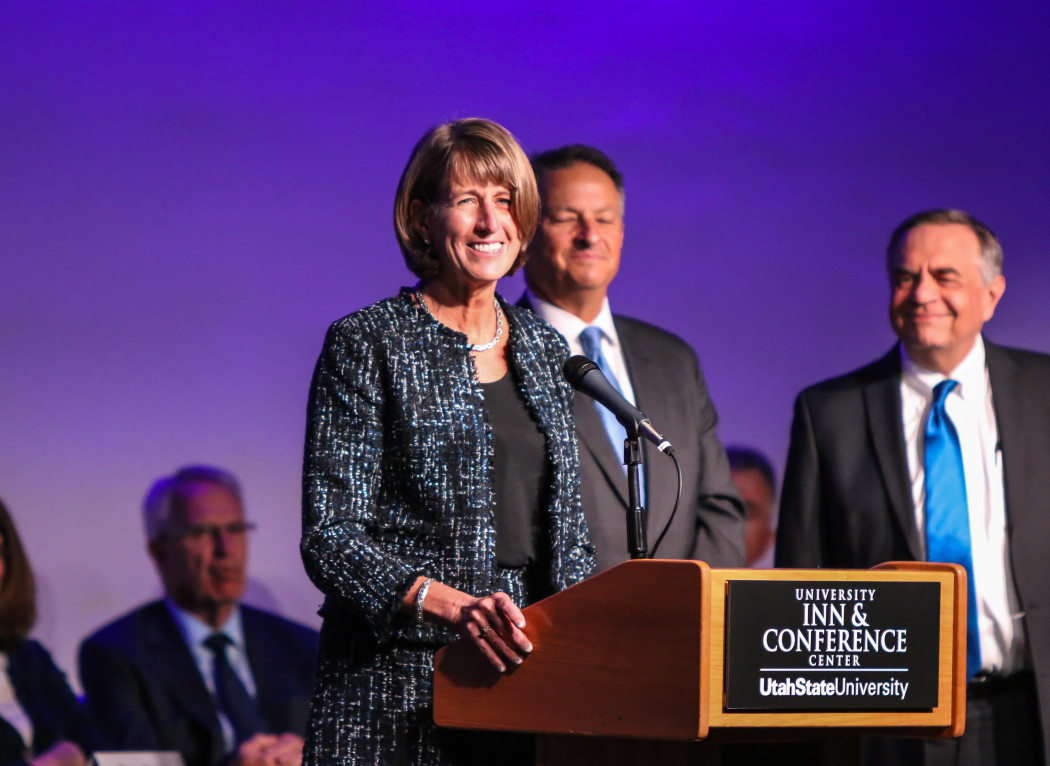Utah State names Noelle Cockett new president
At a meeting in front of colleagues and friends Wednesday, Noelle Cockett accepted an invitation from the Board of Regents to lead Utah State University as the new president.
“Together, we will make USU an institution whose future is boundless and bright,” Cockett said, beaming.
In January, Cockett and her husband, John, will formally take the reins from President Stan Albrecht and first lady Joyce Albrecht to head Utah State University.
Out of the four finalists selected, Cockett was the only incumbent from the university. She has worked closely with Albrecht and other administrators at USU since she was named executive vice president and provost in 2013.
She says she admires the work Albrecht has done and hopes to “build on the successes Stan and Joyce have established.”
“Today I pledge to the USU community that as president I will tirelessly devote my skills, experience and energy to keeping this institution true to its land-grant mission, to doing everything possible to increase its success and impact, and to ensuring that the university flourishes and continues its tradition of excellence in years to come,” she said.
In addition to being the only incumbent, Cockett was also the only female candidate. Now, Cockett will be USU’s first female president. In fact, Cockett is one of only a handful of female presidents who have served at public universities in Utah’s history.
According to her bio on the university’s website, Cockett grew up on a beef cattle ranch in eastern Montana. She has a bachelor’s degree in animal science from Montana State University and a master’s and doctorate degree in animal breeding genetics from Oregon State University.
Cockett spent five years as a research geneticist in Nebraska, and was then hired as an assistant professor at USU in 1990.
“My husband John and I arrived in Cache Valley in 1990, intending to remain only a few years; however, I soon learned how very special Utah State University is and came to realize this is exactly where I wanted to be, both professionally and personally,” she said.
She was promoted to associate professor in 1993 and full professor in 1996. According to her bio, she has also served as the Interim Dean of the School of Graduate Studies and the Vice Provost for Academic Affairs.
Cockett said she’s had a dream to be the president of the university. During the years she worked at the school, she said she grew to admire Albrecht’s leadership and the greatness of the university.
“Like so many others over the 128 years of USU’s existence, I have developed a love and passion for all that Utah State is,” she said.
As university provost, Cockett worked closely with Albrecht and other university administration. In October, Albrecht tasked Cockett with leading a sexual assault prevention task force.
Albrecht said Cockett has his “absolute, full support” and said she has a “great experience ahead of her.”
“I would just urge our administrative team, our faculty, our students, our staff, our boards — and I’m confident that they all will — to support our new president as they have supported me,” Albrecht said.
Albrecht, who announced his retirement in February, will have served as president for almost 12 years when he officially steps down in 2017.
The four finalists, who were announced on Oct. 19, were interviewed in the days preceding the announcement.
They were Don Blackketter, the chancellor of Montana Tech; Keith Miller, a former faculty member at the New President Academy at the American Association of State College and Universities; and Mark Rudin, who has been the vice president for research and economic development at Boise State University since 2007.
On Oct. 26, the candidates were interviewed by four groups of university affiliates, including students, faculty, staff and the Board of Regents. Interviews with each candidate lasted about 40 minutes.
Blake Lyman, a member of a group of about 30 students who represented the student population, said the groups asked the candidates specific questions about how they would lead the university.
Lyman said the interviewers took rigorous notes about the candidates’ potential strengths and weaknesses, then submitted the information to the Board of Regents.
“I definitely think it was fair and needed,” he said. “We each got a chance to really get into some meaty issues. We really got to know the candidates and what they brought to the table.”
The Board of Regents ultimately chose the president, and students didn’t vote on the matter.
Cockett said she is grateful for support from students and colleagues, and hopes to help them continue to see growth and success.
“Our outstanding staff, administration, trustees, and many friends will keep the message alive that USU is an institution of greatness,” she said.
–melmo12@gmail.com
@mcfenstermaker

